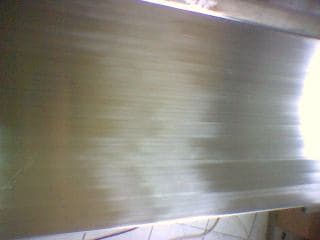
Curated with aloha by
Ted Mooney, P.E. RET

The authoritative public forum
for Metal Finishing 1989-2025

-----
Uniform polish using flap wheels - is it possible?
2005
I am in charge for a workshop in Jakarta, and we have just moved to stainless steel products. Our company makes relatively small amounts of vessels and panels. We are trying to get a uniform hairline finish on 304 stainless steel plates and vessels, mainly to increase the aesthetic value of our products. We tried using a 30,000 RPM Makita hand grinder (die grinder) [adv: die grinders on eBay or Amazon [affil links] with 6" by 1" flap wheels (not flap discs) at 120 grit and then 180 grit, and the result was great per 'lane', but they are not uniform between lanes. We polish in one direction and does this against the direction of the rotation. Polishing is done with little pressure, and we do four runs.

Everyone I asked mentioned that this is a technique problem, but never get into specifics. I would appreciate anyone's feedback on how to achieve a uniform finish. Some of my questions are: Is our RPM too high? Should we do more 'runs'? Should we have started with lower grits? Is the direction wrong? What do the professionals use (other than automatic plate machines)? Does the abrasive play a big part?
Thank you in advance.
Panel and Vessel Workshop - Jakarta, DKI, Indonesia
If you want a uniform finish, I suggest you cover the entire surface with your finishing process. That means that you your equipment is too small. You may want to look into and group a number of wheels or create a pass through type process.

AF Kenton
retired business owner - Hatboro, Pennsylvania
2005
On a similar subject. I am new to stainless finishing and I am totally confused by the number of alternative abrasives. What are the differences between; gum wheels, flap wheels, woven wheels, and nonwoven wheels. I know the physical difference but what physical feature does each contribute to the appearance? Using the same grit#, what advantage does one have over the other?
Thanks for the help.
small fabricator - Imperial, PA, U.S.A.
2005
There are whole books on this subject. There is no short quick answer. A lot of good articles on the subject can be found in trade publications and by manufacturers. Two that come to my mind are the Metal Finishing and Products Finishing Guidebook & Directory.

AF Kenton
retired business owner - Hatboro, Pennsylvania
2005
2005
You can use
emery
⇦ this on
eBay or
Amazon [affil links]
(synthetic or natural) on cotton or sisal mops with glue. This is very effective for automobile accessories and dinnerware. You can top it up with buffing with applying green rouge bar
⇦ this on
eBay or
Amazon [affil links]
on a soft cotton mop.
Also, start with #120 and then # 150 and finally #180.
- Jamnagar, Gujrat, India
We are one of the convertor of coated abrasives based in INDIA.
I would suggest using a Non Woven Abrasive of the same to blend the Tracks.
- Mumbai, Mahrashtra, INDIA
2005
2005
Hi Paulus,
I've only got one suggestion ... and that is, if there is a plexiglass fabricator near you, go and visit him.... you might get some good ideas.
Why? Because to get an end polish on acrylic sheet, bar or items, they use a large flap wheels ... but, as they are not into metals, they don't, I think, use any
jeweler's rouge
⇦ this on
eBay
or
Amazon [affil links] or similar polishing additives. Just floppy, flappy, flipping cloths rotating at a reasonable rate of knots which seals the presanded surface with a good glossy shine.
The suggestions by others are pretty good but certainly your mini mouse grinder approach is n.b.g.

Freeman Newton [deceased]
(It is our sad duty to advise that Freeman passed away
April 21, 2012. R.I.P. old friend).
Q, A, or Comment on THIS thread -or- Start a NEW Thread